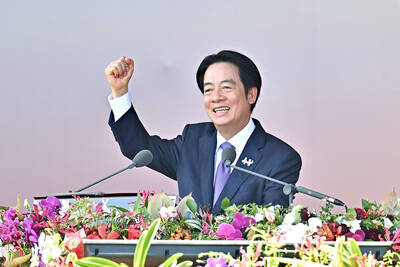Australian Prime Minister Malcolm Turnbull’s conservative coalition has won enough seats to govern in its own right after a cliffhanger July 2 election, according to Australian Broadcasting Corp (ABC) projections yesterday.
The incumbent Liberal/National coalition, which declared victory on Sunday after the Labor opposition conceded defeat eight days after national polls, secured 76 seats in the 150-seat lower House of Representatives, according to the ABC, the minimum for a majority.
The opposition Labor party is predicted to win 69, the ABC said.

Photo: EPA
Independents and small parties have secured five seats in the parliament’s lower house and have won key Senate seats.
Counting is continuing in some closely fought contests and a final declaration might take several more days, leaving Turnbull the hard task of uniting a divided parliament in order to pass legislation.
Australian Minister for Industry, Innovation and Science Christopher Pyne told ABC radio that the coalition had a clear mandate to deliver on its election promises.
“Whether you win a grand final by one goal or six goals, a win is a win is a win,” Pyne said.
Moody’s Investors Service yesterday joined Standard and Poor’s (S&P) in expressing concern that a splintered Senate would stymie agreement on fiscal consolidation and macroeconomic policy.
Moody’s said such a scenario would be “credit negative,” echoing S&P’s decision last week to cut Australia’s credit rating outlook to negative from stable, threatening a downgrade of its coveted “triple A” status.
The make-up of the Senate, where the government requires support for legislative changes, is still unclear.
However, small parties run by the far-right politician Pauline Hanson and centrist Nick Xenophon are on track to win several positions, making them a force in the next parliament.
Some conservative members of the Liberal Party blame their centrist leader for a loss in votes that left them perilously close to conceding power, putting pressure on Turnbull to reverse unpopular policies such as changes to state pensions.
The junior coalition partner, the Nationals, are agitating for an extra seat in Cabinet given they are on track to increase their representation in parliament.

The Ministry of the Interior (MOI) is to tighten rules for candidates running for public office, requiring them to declare that they do not hold a Chinese household registration or passport, and that they possess no other foreign citizenship. The requirement was set out in a draft amendment to the Enforcement Rules of the Public Officials Election and Recall Act (公職人員選舉罷免法 ) released by the ministry on Thursday. Under the proposal, candidates would need to make the declaration when submitting their registration forms, which would be published in the official election bulletin. The move follows the removal of several elected officials who were

FOUR DESIGNATED AREAS: Notices were issued for live-fire exercises in waters south and northwest of Penghu, northeast of Keelung and west of Kaohsiung, they said The military is planning three major annual exercises across the army, navy and air force this month, with the navy’s “Hai Chiang” (海強, “Sea Strong”) drills running from today through Thursday, the Ministry of National Defense said yesterday. The Hai Chiang exercise, which is to take place in waters surrounding Taiwan, would feature P-3C Orion maritime patrol aircraft and S-70C anti-submarine helicopters, the ministry said, adding that the drills aim to bolster the nation’s offshore defensive capabilities. China has intensified military and psychological pressure against Taiwan, repeatedly sending warplanes and vessels into areas near the nation’s air defense identification zone and across

SENATE RECOMMENDATION: The National Defense Authorization Act encourages the US secretary of defense to invite Taiwan’s navy to participate in the exercises in Hawaii The US Senate on Thursday last week passed the National Defense Authorization Act (NDAA) for Fiscal Year 2026, which strongly encourages the US secretary of defense to invite Taiwan’s naval forces to participate in the Rim of the Pacific (RIMPAC) exercise, as well as allocating military aid of US$1 billion for Taiwan. The bill, which authorizes appropriations for the military activities of the US Department of Defense, military construction and other purposes, passed with 77 votes in support and 20 against. While the NDAA authorizes about US$925 billion of defense spending, the Central News Agency yesterday reported that an aide of US

NATIONAL DAY: The ‘Taiwan Dome’ would form the centerpiece of new efforts to bolster air defense and be modeled after Israel’s ‘Iron Dome,’ sources said President William Lai (賴清德) yesterday pledged to strengthen the nation’s air defense capabilities and build a “T-Dome” system to create a safety net against growing military threats from China. “We will accelerate our building of the T-Dome, establish a rigorous air defense system in Taiwan with multi-layered defense, high-level detection and effective interception, and weave a safety net for Taiwan to protect the lives and property of citizens,” he said in his National Day address. In his keynote address marking the Republic of China’s (ROC) 114th anniversary, Lai said the lessons of World War II have taught nations worldwide “to ensure that